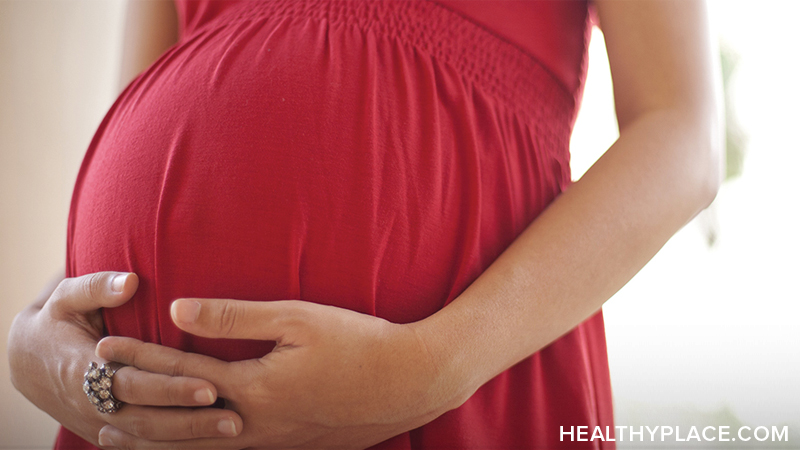Pregnancy and Bipolar Disorder (Treatment/Management Issues)

Pregnancy and bipolar disorder can introduce a new set of complications and women of childbearing age with bipolar disorder face certain increased risks. Pregnancy and delivery can influence the symptoms of bipolar disorder:
- Pregnant women or new mothers with bipolar disorder have a sevenfold higher risk of hospital admission.
- Women who are bipolar and pregnant have a twofold higher risk for a recurrent episode, compared with those who have not recently delivered a child or are not pregnant.
Careful planning for pregnancy and bipolar complications can help minimize symptoms and avoid risks to the fetus. Experts suggest it is important to avoid sudden changes in bipolar medication during pregnancy because such changes may increase side effects and risks to the fetus, and also increase the risk of bipolar relapse before or after the woman gives birth.
Bipolar Medications and Pregnancy
To reduce risk to the fetus, it's optimal to prevent bipolar relapse and expose the unborn child to as few bipolar medications as possible. Studies show that exposure to only one mood stabilizer during pregnancy is less harmful to the developing fetus than exposure to multiple medications.
(Learn more about Bipolar Disorder Medications.)
Mood Stabilizers During Pregnancy
Mood stabilizers during pregnancy can cause risk to the fetus and have been shown to cause birth defects. However, mood stabilizers taken at the time of pregnancy are often continued as getting off the drug while pregnant may be riskier to the fetus than the medication. Valproate (Depakote) is an exception, however, and should be avoided altogether.1
Pregnancy and bipolar can be difficult to manage but after a review of literature, it was found that lithium or lamotrigine are preferred mood stabilizers during pregnancy, if necessary. While taking lithium, it is important women stay hydrated to prevent lithium toxicity in themselves and the fetus. Careful monitoring of lithium levels, especially during delivery and immediately after birth, can help prevent a relapse in the mother and will also show if there are high lithium levels in the infant.
Lithium is the only drug proven to reduce the rate of relapse of illness from nearly 50% to less than 10% when women continue or begin lithium after giving birth. Lithium and lamotrigine (Lamictal)2 are secreted in breast milk so breastfeeding should be avoided.
Breastfeeding while taking mood stabilizers is not recommended as the medication is secreted into breast milk but the American Academy of Pediatrics indicates the following bipolar medications are likely not harmful during breastfeeding:
(Learn more about Mood Stabilizers for Bipolar Disorder.)
Antipsychotics in Pregnancy
Information on antipsychotics in pregnancy is limited. At this time, it appears atypical antipsychotics have limited detrimental impact on the fetus during bipolar pregnancy but the medication is excreted in breast milk so breastfeeding should be avoided. There is a concern with increased birth weight when olanzapine is taken during pregnancy, however. Weight gain, blood sugar levels, and blood pressure should be monitored carefully in all pregnant women taking atypical antipsychotic medications.1
There is no long-term study on the children born to mothers who used antipsychotics during pregnancy.
(Learn more about Antipsychotic Medications for Bipolar Disorder.)
Bipolar Medications in Pregnancy: Tranquilizers and Sedatives
Tranquilizers like lorazepam (Ativan) should be avoided in first trimester due to increased risk of congenital malformations and shortly before delivery due to risk of floppy infant syndrome. For pregnancy and bipolar, medications that stay in the body the least amount of time are preferred. Sedatives and hypnotics are excreted in breast milk, but there have been few reports of complications due to their use.
Pregnancy and Bipolar: Electroconvulsive Therapy (ECT)
Electroconvulsive therapy (ECT) for bipolar disorder is considered safe and effective for the mother and fetus. ECT is a potential treatment for those bipolar and pregnant in:
- Depressive episodes
- Mixed episodes
- Manic episodes
When used in women who are pregnant, ECT may pose fewer risks than untreated mood episodes or treatment with medications known to be harmful to fetuses. Complications of ECT during pregnancy and bipolar are uncommon. Monitoring heart rate and oxygen levels of the fetus during ECT can detect most problems, and medications are available to correct difficulties. Intubation or antacids may also be used to decrease the risk of gastric regurgitation or lung inflammation during anesthesia for ECT. ECT can be used while breastfeeding.3
Source: NAMI Advocate, Spring/Summer 2004
APA Reference
Tracy, N.
(2021, December 28). Pregnancy and Bipolar Disorder (Treatment/Management Issues), HealthyPlace. Retrieved
on 2025, December 19 from https://www.healthyplace.com/bipolar-disorder/bipolar-women/pregnancy-and-bipolar-disorder-treatment-management-issues


